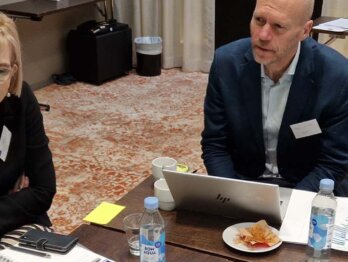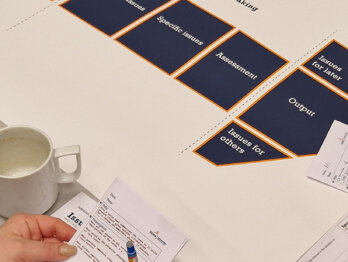New Year’s Anticipatory Innovations

New Year’s resolutions are so frequently unfulfilled that it has become a cliché to cynically write them off as futile. We create them in the hopes of creating innovation in our lives, but often they fall short of the novel, implemented, impactful action that innovation implies. Why does this happen? Many would argue it’s to do with the resolutions themselves—their scope, ambition, execution, and definition. A quick internet search will find you countless advice articles telling you to make your goals specific, measurable, achievable, relevant, and time-bound (SMART). That’s important of course, but it’s missing an important dimension. That dimension is the context in which we try to achieve our goals: the bumps and blocks in the road, the resources at our disposal, and the convictions driving us forward.
2020 reminded us very powerfully that the world around us can change rapidly, dramatically, and in ways beyond our control. But that does not mean our resolutions are doomed to fail. There are ways to achieve success even in volatile, uncertain, and complex circumstances. Strategic foresight, a part of anticipatory innovation governance, helps us to perceive, make sense of, and act on ideas of the future emerging in the present. And innovation approaches help us to put foresight into practice.
There are ways to achieve success even in volatile, uncertain, and complex circumstances.
In the OPSI Anticipatory Innovation team, we’re looking at the new year as a chance to use the approaches of strategic foresight to benefit our lives, work, and careers. In this blog post, each of our team members, Angela, Chiara, Heather, Josh, and Piret is sharing how an approach of strategic foresight can be used to go beyond resolutions and create anticipatory innovations. In each paragraph, we will give you a question to help apply strategic foresight to your own resolutions. These questions are intended to help you let go of the past, set bold visions for success, prepare for setbacks, plan and rehearse the steps you’ll need to take, and get started now. At the end we look at how OPSI is taking public sector innovation forward in 2021.
Leave the past behind

Angela Hanson, innovation tools and methods lead: “Very often we assume the future will be a continuation of past trends. Very often it is, but humans also tend to overestimate how much our past binds us in the future. It is possible for unprecedented things to happen, and it is possible to create something entirely new. Have you ever shied away from doing what’s needed to pursue a goal because you think ‘I’ve never been the kind of person who does this’ or ‘I don’t have any experience in that’? Then you’re prejudging your future with stories of the past. Instead, you have the option to change direction, to become a beginner at something, to abandon something that made sense to you in the past but no longer makes sense in the future. C.S. Lewis wrote ‘you can’t go back and change the beginning, but you can start where you are and change the ending.’ For my new year’s anticipatory innovations I’m thinking about the past beliefs that hold me back, and mentally sacrificing those beliefs so I can go further and faster in 2021 without the baggage.”
What belief do you need to debunk in order to achieve your goals in 2021?
Vision your future success

Piret Tõnurist, team leader: “Many New Year’s resolutions, like many public sector policies and innovations, are aimed at solving problems. That’s important, but we shouldn’t lose sight of why something is considered a problem, why it’s worth solving, or even what type of a problem we are dealing with—puzzle or a mystery? What really gives meaning to our goals? What do we really value? How do we want the future to look different to anything we’ve seen before? People might tell themselves that their goal is to lose a certain number of kilos or reduce their alcohol consumption to a certain level, but the real vision underlying these goals is a longer life or a healthier body, or a greater sense of well-being. Visions inspire, guide, and motivate us in a way that SMART objectives on their own just don’t. It’s been said that ‘if you don’t know where you want to go you’ll end up somewhere else.’ For my new year’s anticipatory innovations I’m setting a bold vision for what I want to achieve in the first quarter of 2022, and aligning my actions in 2021 to get there.”
What big, inspirational goal do you aspire to in setting your resolutions for 2021?
Be imaginative about new windows of opportunity

Chiara Bleckenwegner, innovation and missions consultant: “When looking for inspiration for new year’s resolutions, I searched the web for surveys on the goals people set themselves for 2020. A disappointingly high percentage of people went for the usual suspects: exercising more, saving money, eating more healthily, and losing weight. Of course these are all worthy and important resolutions, but I wondered if there might be ways to come up with something more imaginative and therefore innovative. I only recently joined the OECD, and moved house too. 2021 is therefore sure to be a year like no other for me. There will be challenges, but also new windows of opportunity that I’ve never had before. Sources of inspiration can come from unexpected places, so for my new year’s anticipatory innovations I’m going to do an advance exploration about all the different experiences I might have in 2021 and thinking about things I can do today to be ready to make the most of them.”
What new and unexpected opportunities could 2021 hold for you that you can resolve now to make the most of?
Prepare for setbacks and rehearse the steps

Heather Buisman, innovation consultant: “2020 was a powerful example of how a change in circumstances can force us to change the way in which we advance our objectives. I joined the OECD in 2020, excited to travel and work with stakeholders around the world to make the public sector more innovative. Instead, I had a record number of meetings from my home office in pyjamas and a blazer. I wanted to run a marathon, and instead I did virtual races with friends and created a make-shift home gym. We have all had to adapt to unexpected circumstances but, as I’m sure anybody searching for kettlebells online would agree, adapting is much easier when you are prepared with resources, mechanisms and tools to do so. As we face the uncertain possibilities of 2021, which could involve economic shifts, extreme weather, changing social and policy priorities, and (dare I say), another international health crisis, we need to be ready to adapt to the possibilities. For my new year’s anticipatory innovations I’m imagining and rehearsing the different scenarios in which I might need to adapt quickly, stand for what I believe in, and develop alternative approaches to advance what matters to me in unexpected ways.”
What setbacks and difficulties could you identify and rehearse in advance to keep your goals for 2021 on track?
Anticipate now!

Josh Polchar, strategic foresight lead: “There is a fable about three people in a boat paddling furiously with their hands and getting nowhere fast. Someone on the shore shouts to them that they have an idea about using an oar. The people in the boat reply that they don’t have time for that because they’re too busy paddling with their hands. This ridiculous situation is exactly what is happening when people say they’re too busy with so-called short-term issues to think about the long term. Most people would agree that there is value in thinking about and preparing the future, but not enough of them realise that it has to happen now to be called anticipation. The future is born in the present, our understanding of it can only exist in the present, and we can only act in the present. When we choose delay thinking about the future, it’s not anticipation; it’s procrastination. When we choose to delay responding to the future, it’s not preparation; it’s reaction. For my new year’s anticipatory innovations I’m identifying something I want to achieve that I’m not ready for, or that I didn’t think I had time for, and am starting work on it right now.”
What’s a first step you can take right now towards something you don’t think you’re yet ready for in 2021?
Putting anticipation to work
The questions in this article apply just as well to our personal resolutions as to the strategies and plans governments make. They are designed to challenge our assumptions whenever we think about the future—which is all the time. At OPSI we are advancing our work programme to support governments in their innovation agendas. In 2021 we are producing innovation scans, frameworks to assess and compare innovation systems, support to embedding anticipatory innovation, capacity-building, and network engagement through numerous events. We have imaginative visions of our own success, scenarios on our future role, and plans to put our ideas into action in the present. To learn more about anticipatory innovation at OPSI, please see our newly published working paper. To engage further on how OPSI can support anticipatory innovation in your organisation, please get in touch.












